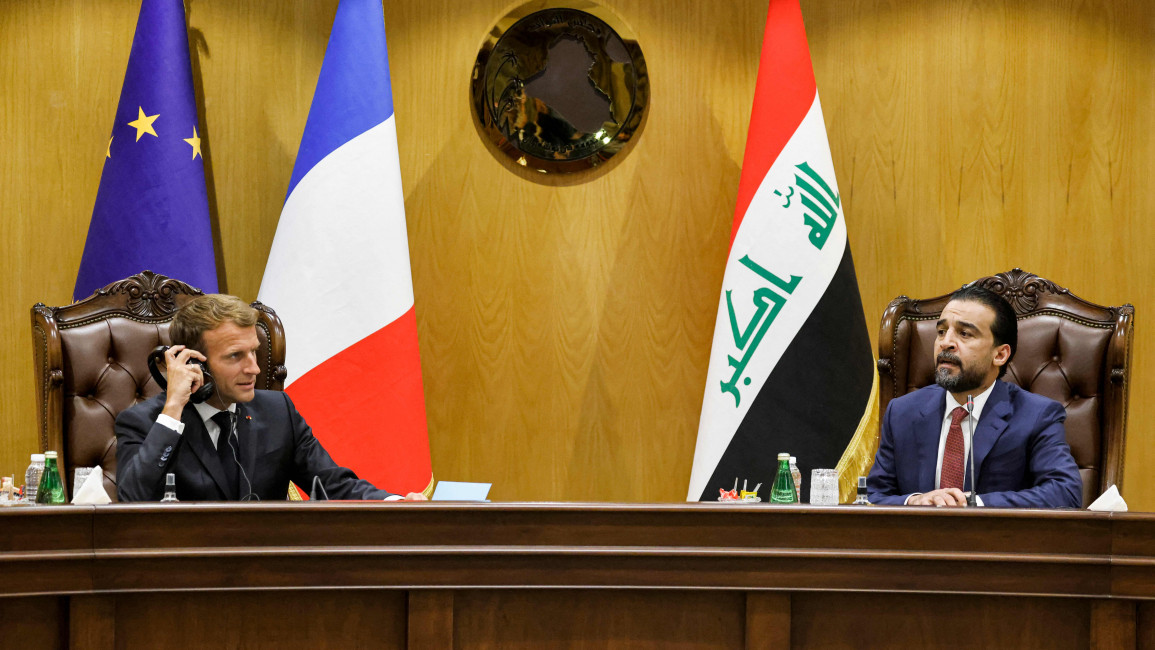Afghanistan overshadows Iraq summit as Macron vows to stay put
The Taliban's takeover of Afghanistan overshadowed a summit in Baghdad on Saturday grouping key regional leaders as well as French President Emmanuel Macron who vowed his country would stand firm in Iraq.
"Given the geopolitical events, this conference has taken a special turn," Macron said at the summit convened by Iraq as it seeks to play the role of regional mediator.
Macron said his country would continue to deploy troops in Iraq to battle terrorism even if the US were to withdraw.
"No matter what choices the Americans make, we will maintain our presence in Iraq to fight against terrorism," Macron told a news conference in Baghdad.
The meeting comes as Iraq, long a casualty of jihadist militancy, also tries to establish itself as a mediator between Arab countries and Iran.
"We all know that we must not lower our guard, because Daesh (the Islamic State group) remains a threat, and I know that the fight against these terrorist groups is a priority of your government," Macron said earlier after a meeting with Iraqi Prime Minister Mustafa al-Kadhimi.
Iraq and France are "key partners in the war against terrorism", Kadhimi replied.
Egyptian President Abdel Fattah al-Sisi and Jordan's King Abdullah II flew in for the summit, also attended by the foreign ministers of regional foes Iran and Saudi Arabia.
Qatar's Emir Sheikh Tamim bin Hamad Al-Thani, Dubai's ruler, Sheikh Mohammed bin Rashid Al-Maktoum, Kuwait's Prime Minister Sheikh Sabah Al-Khalid Al-Sabah and Turkey's foreign minister Mevlut Cavusoglu also took part.
'More urgent than ever'
Iraq is seeking to play a "unifying role" to tackle crises shaking the region, sources close to Iraq's Kadhemi said.
Oil-rich Iraq has been caught for years in a delicate balancing act between its two main allies, Iran and the United States.
Iran exerts major clout in Iraq through allied armed groups within the Hashed al-Shaabi, a powerful state-sponsored paramilitary network.
Baghdad has been brokering talks since April between US ally Riyadh and Tehran on mending ties severed in 2016.
"It was really not easy to put the Saudis and Iranians in the same room," a French diplomatic source said.
But an adviser to Kadhimi said that just the presence of the two foreign ministers together was itself a "success".
Macron aims to highlight France's role in the region and its determination to press the fight against terrorism, his office said.
The French president considers Iraq "essential" to stability in the troubled Middle East, it added.
The Baghdad conference "will make it possible to lay the framework for cooperation in the fight against terrorism," Macron said.
An Islamic State (IS) group affiliate claimed Thursday's suicide bombing in Kabul that killed scores of people, including 13 US service members.
The attack has revived global concerns that the extremist organisation, which seized swathes of Syria and Iraq before being routed from both countries, is emerging anew, analysts said.
The blast came during the final days of US-led evacuations from Afghanistan after the Taliban's lightning takeover.
While in Baghdad, Macron held separate talks with Qatar's emir on a possible role for Doha, which has good contacts with Taliban having hosted peace talks, in organising further evacuations beyond an August 31 deadline set by Washington, sources close to the president said.
The French leader told reporters that Paris was in talks with the Taliban through Qatar to "protect and repatriate" Afghans at risk.
Evacuations are planned jointly with Qatar and may involve "airlift operations", Macron said after the summit.
He added that France, which ended its evacuations from Afghanistan on Friday, had evacuated 2,834 people from there since August 17.
A decade after the 2003 US-led invasion that ousted dictator Saddam Hussein, IS in 2014 announced a "caliphate" in territory seized in Syria and Iraq, routing the badly prepared Iraqi army without a fight and seizing almost a third of the country.
France was part of a US-led coalition established to battle the extremists.
Iraq declared IS territorially defeated in December 2017, but the group still retains sleeper cells and continues to claim bloody attacks.
'New IS strides'
One of the deadliest was a July bombing that ripped through a crowded Baghdad market, killing over 30 people on the eve of a key Muslim holiday.
According to Colin Clarke, senior research fellow at the Soufan Center, IS "still has access to tens of millions of dollars and will likely continue to rebuild its network throughout Iraq and Syria".
In July, President Joe Biden said US combat operations in Iraq would end this year, but that US soldiers would continue to train, advise and support the country's military in the fight against IS.
Washington currently has 2,500 troops deployed to Iraq.



